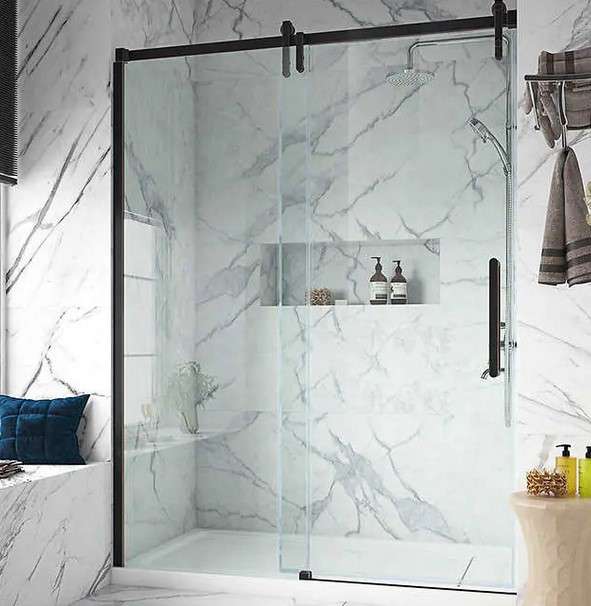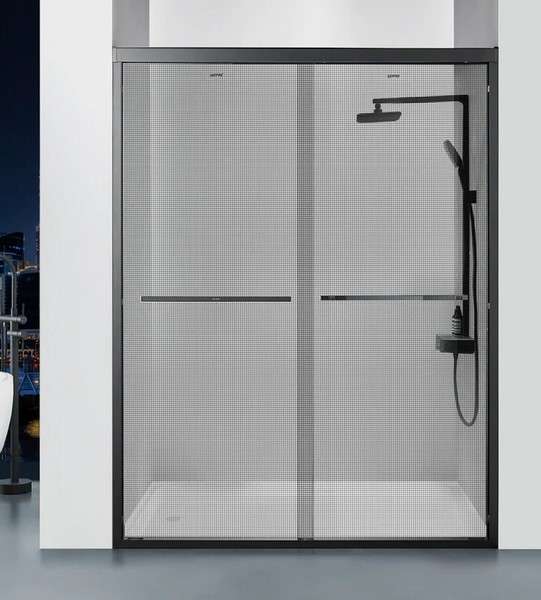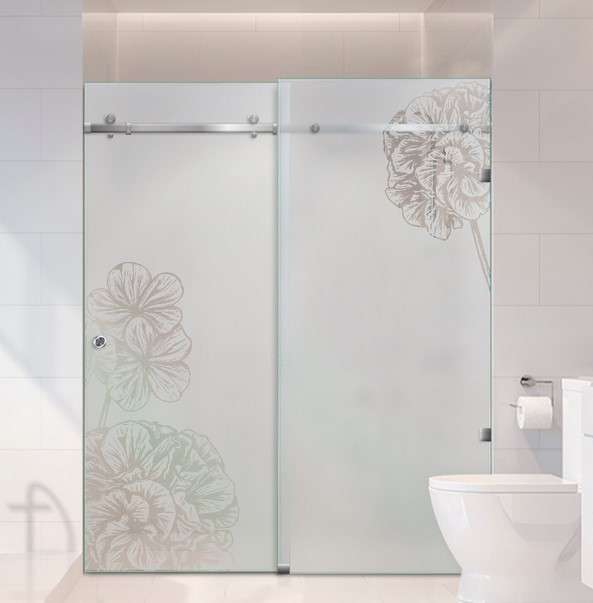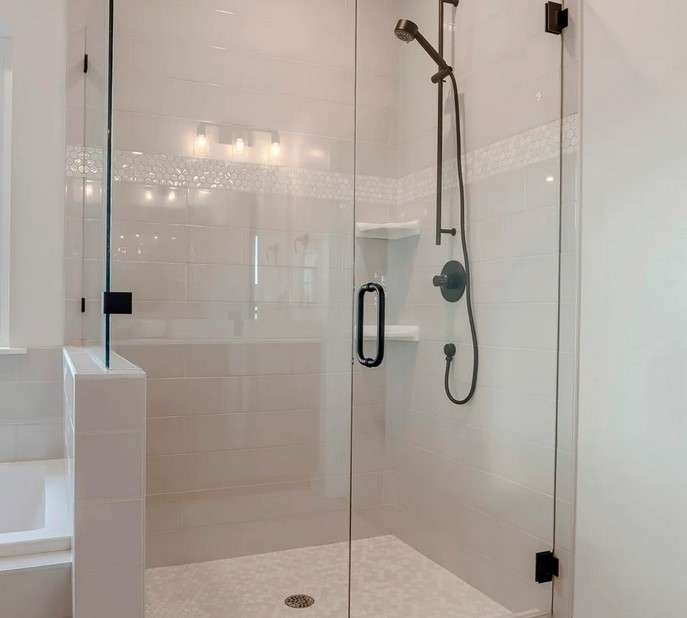Your bathroom’s design hinges on several essential components, and your shower enclosure ranks high among them. It not only keeps water from splashing all over but also contributes significantly to the overall aesthetics of the space.
When it comes to selecting the right glass for your shower doors, you’ll be presented with several choices, each with its unique benefits and drawbacks. In this comprehensive guide, we will delve into the various types of glass available, helping you make the best-informed decision for your shower doors.
Different Types of Glass for Shower Enclosures
When embarking on the journey of choosing the perfect glass for your shower doors, you’ll quickly discover that there are several distinct types to consider. Each type of glass comes with its own set of advantages and limitations, so it’s crucial to explore all your options before settling on the ideal choice.
1. Tempered Glass

Tempered glass stands out as the most widely used material for shower doors. Its exceptional strength is achieved by subjecting the glass to extreme temperatures, rendering it four to five times stronger than standard glass.
This glass variety is also heat-resistant, making it a prime choice for shower applications. However, its increased durability and resilience come at a cost, as tempered glass tends to be pricier than its standard counterpart. Additionally, it’s not suitable for curved shower enclosures, limiting its design flexibility.
2. Laminated Glass

Laminated glass is a robust safety glass composed of two layers of glass sandwiching a plastic interlayer. This construction renders it highly durable and resistant to cracking and shattering. It also boasts resistance to UV damage, ensuring that it won’t fade over time.
The main drawback of laminated glass is its cost, which is notably higher than tempered glass. Moreover, it’s generally unavailable in curved shapes, which may limit design options for some.
3. Frosted Glass

Frosted glass, a textured glass variety, features a frosted or etched surface. This glass is a preferred choice for shower doors, as it offers an extra layer of privacy while still permitting the passage of light. It’s easy to clean and comes in a variety of shapes and sizes.
However, it’s essential to note that frosted glass lacks the same strength and durability as tempered or laminated glass, making it less suitable for certain applications.
4. Low-Iron Glass

Low-iron glass undergoes a chemical treatment process to reduce its iron content. The result is optically clear glass with higher light transmittance than standard glass.
In addition to its optical clarity, low-iron glass boasts increased scratch resistance, making it a top pick for frameless shower enclosures. Nevertheless, its advantages come with a higher price tag compared to standard glass.
Which Type of Glass Is Best for Shower Doors?
When it comes to choosing the ideal glass for your shower doors, there’s no one-size-fits-all answer. Your decision should hinge on factors such as your budget, the style of your shower enclosure, and your desired levels of privacy and durability.
Tempered Glass: For those seeking an affordable yet durable option, tempered glass remains the preferred choice. It can withstand the force of water and is available in various shapes and sizes.
Frosted Glass: If privacy is a top priority, frosted glass is an excellent option. It offers an extra layer of seclusion while still allowing natural light to filter through.
Low-Iron Glass: If luxury and optical clarity are your aims, low-iron glass takes center stage. Its higher light transmittance and scratch resistance make it the perfect match for frameless shower enclosures.
Laminated Glass: When strength and durability are non-negotiable, laminated glass is the way to go. It's highly resistant to cracking and shattering and won't suffer from UV-induced fading over time.In Conclusion
Selecting the right glass for your shower doors may seem like a daunting task. However, by thoroughly considering your options and taking into account your budget, the style of your shower enclosure, and your desired level of privacy and durability, you can identify the perfect glass for your needs.
Tempered glass, known for its strength, affordability, and versatility in shapes and sizes, is the go-to choice for many. If privacy is paramount, frosted glass provides an elegant solution. Low-iron glass, with its optical clarity and scratch resistance, lends an air of luxury to frameless shower enclosures. And for those who prioritize strength and durability, laminated glass proves to be the most resilient option.
Regardless of your choice, it’s essential to have your glass professionally installed to ensure the best possible results. Your shower doors are a focal point in your bathroom, and the right glass selection can elevate the aesthetics while serving its practical purpose.
Related Posts:-
What Causes Scratches on Glass Shower Doors?
What is the best type of glass for a shower door in terms of durability and safety?
Selecting the optimal glass for a shower door, with a primary focus on durability and safety, is a crucial decision for any homeowner. To strike the perfect balance between these two vital attributes, you should consider a few key factors that encompass the type of glass, its thickness, and any additional safety features.
- Tempered Glass: Undoubtedly, tempered glass is the premier choice when it comes to shower doors. This type of glass undergoes a specific heat treatment process, which enhances its strength and durability significantly. In the event of breakage, tempered glass shatters into small, less harmful fragments, reducing the risk of injury. Its resilience against impact and temperature fluctuations makes it an ideal choice for shower doors.
- Thickness Matters: The thickness of the glass is another critical element in ensuring both durability and safety. Thicker glass, typically ranging from 3/8 to 1/2 inch, is more robust and less prone to damage, such as chipping or cracking. Thicker glass also provides a sense of sturdiness and longevity, which can enhance your overall shower experience.
- Laminated Glass: For an extra layer of safety, you might consider laminated glass. This type of glass consists of two or more layers with a PVB (polyvinyl butyral) interlayer, which holds the glass together in case of breakage. Laminated glass not only adds a layer of security but also reduces noise transmission, making your shower experience quieter and more peaceful.
- Etching or Textured Glass: For privacy and safety, you can opt for etched or textured glass. This provides a frosted appearance, obscuring the view from outside the shower while allowing light to filter through. It not only enhances privacy but also minimizes the risk of accidental collisions due to obscured vision.
- Frameless Design: Choosing a frameless shower door can also contribute to safety and durability. Frameless designs minimize the number of metal components that can corrode over time and simplify cleaning, reducing the risk of mold and mildew buildup.
- Hinges and Hardware: Pay attention to the quality of hinges and hardware. Stainless steel or solid brass hardware is recommended for their corrosion resistance and durability.
In summary, the best type of glass for a shower door in terms of durability and safety is tempered glass, preferably with additional thickness and safety features such as laminated glass or textured designs. Pair it with quality hardware and a frameless construction for an elegant and long-lasting shower enclosure.
Ultimately, your choice should align with your specific needs, style preferences, and budget, but prioritizing durability and safety is paramount.
Can you recommend a type of glass for shower doors that is resistant to stains and water spots?
When it comes to selecting the ideal glass for your shower doors, you’ll want a type that not only offers an elegant appearance but also exhibits exceptional resistance to stains and water spots. To strike the perfect balance between aesthetics and practicality, consider opting for low-iron glass with a hydrophobic coating.
Low-iron glass, also known as ultra-clear glass, is manufactured with reduced iron content, making it nearly colorless. This feature allows it to transmit more light and showcase the true beauty of your bathroom tiles and fixtures. It’s a superb choice for those who desire a crystal-clear, pristine look for their shower enclosure.
To enhance its stain and water spot resistance, you can further augment low-iron glass with a hydrophobic coating. This innovative treatment creates a microscopically smooth surface that repels water droplets and prevents minerals and soap residue from adhering to the glass. As a result, it not only maintains the clarity of the glass but also reduces the need for frequent and rigorous cleaning.
In summary, for shower doors that resist stains and water spots while exuding an effortlessly chic appeal, the combination of low-iron glass and a hydrophobic coating stands out as a comprehensive and smart choice. This pairing not only ensures a stunning and spotless
Are there specific types of glass that are more resistant to shattering or breakage for shower doors in high-traffic bathrooms?
When it comes to choosing the right glass for shower doors in high-traffic bathrooms, durability and resistance to shattering or breakage are paramount. There are indeed specific types of glass that excel in these qualities, ensuring both safety and longevity.
Tempered Glass:
This is the go-to choice for shower doors in high-traffic areas. Tempered glass is heat-treated to make it several times stronger than regular glass. This process also alters its breakage pattern. Instead of sharp, jagged shards, it crumbles into small, relatively harmless pieces when broken, reducing the risk of injury.
Laminated Glass:
Laminated glass consists of multiple layers with a polymer interlayer sandwiched between them. This design makes it exceptionally tough and provides an added layer of protection against shattering. Even if it does break, the interlayer holds the glass fragments together, preventing them from scattering.
Acid-Etched Glass:
While not as strong as tempered or laminated glass, acid-etched glass offers an advantage in terms of privacy and safety. Its frosted appearance limits visibility, which can be beneficial in a high-traffic bathroom. Additionally, the acid etching process can make the glass surface more resistant to shattering compared to standard glass.
Frameless Designs with Minimal Hardware:
Opting for frameless shower doors with minimal hardware can contribute to their overall durability. These designs typically use thicker glass, reducing the risk of breakage. Additionally, fewer metal parts mean fewer stress points, which can enhance the structural integrity of the door.
Textured or Patterned Glass:
Textured or patterned glass can offer added strength due to the design and surface irregularities. While not as shatter-resistant as tempered or laminated glass, these patterns can reduce the visibility of potential stress points, improving the glass’s overall durability.
Custom Solutions:
Sometimes, the best approach is to consult with a professional who can recommend a custom solution based on your bathroom’s specific needs. They can consider factors such as the layout, traffic, and design preferences to provide a tailored recommendation for a resilient and aesthetically pleasing shower door.
In conclusion, there are several types of glass that can enhance the resistance to shattering or breakage for shower doors in high-traffic bathrooms. Tempered and laminated glass stand out as the top choices for their superior strength and safety features.
However, other options, such as acid-etched, textured, or custom solutions, can also be viable, depending on your particular requirements and design preferences. Always consult with a glass professional to ensure you choose the best option for your specific situation.
What are the benefits of using frosted or patterned glass for shower doors in terms of privacy and style?
Using frosted or patterned glass for shower doors can offer a multitude of benefits, striking a harmonious balance between privacy and style in your bathroom space.
These design choices not only enhance the aesthetic appeal of your shower area but also contribute to a more functional and comfortable experience.
Here are some of the comprehensive advantages of opting for frosted or patterned glass shower doors:
- Enhanced Privacy: Frosted or patterned glass obscures the view of the interior, creating a discreet and secluded environment within your shower space. This added privacy is especially valuable if you share a bathroom or have large windows nearby, as it keeps prying eyes at bay while you enjoy your shower.
- Aesthetic Appeal: These types of glass add an element of sophistication and charm to your bathroom. The textured or frosted patterns introduce a touch of elegance, making your shower space visually appealing. Whether you prefer a contemporary or traditional style, frosted and patterned glass can complement a variety of design schemes.
- Natural Light: While ensuring privacy, frosted or patterned glass still allows natural light to filter through. This feature is particularly advantageous as it creates a brighter and more inviting atmosphere in your bathroom, reducing the need for artificial lighting during the day.
- Easy Maintenance: Frosted or patterned glass tends to show fewer water spots and streaks compared to clear glass, making maintenance more straightforward. You’ll spend less time cleaning and more time enjoying your shower.
- Concealing Water Stains: Even if you have hard water with a high mineral content, the textured or frosted patterns can help conceal water stains and mineral deposits, ensuring your shower doors maintain their pristine appearance for longer periods.
- Customization: Frosted and patterned glass come in a variety of designs and styles, allowing you to personalize your bathroom to your taste. Whether you prefer a classic frosted look, a modern geometric pattern, or something more artistic, you can find a design that complements your bathroom’s overall decor.
- Reduced Clutter: The obscured view of the shower’s interior can create a sense of tidiness, as it minimizes the need for additional shower curtains or blinds. This can make your bathroom appear more spacious and less cluttered.
- Versatility: Frosted or patterned glass can be used in various shower door styles, including sliding, pivot, or hinged doors, making them adaptable to different bathroom layouts.
In conclusion, choosing frosted or patterned glass for your shower doors brings a delightful blend of practicality and aesthetics to your bathroom.
It offers the perfect solution to maintain privacy without compromising on style, and it’s a design choice that can significantly enhance your daily shower experience while elevating the overall look and feel of your bathroom space.
Is there a specific type of glass that is easier to clean and maintain for shower doors, especially in hard water areas?
choosing the right type of glass for your shower doors can make a world of difference in ease of cleaning and maintenance, especially in regions plagued by hard water deposits. While there isn’t a “miracle” glass that eliminates all upkeep, some options are decidedly more shower-friendly than others.
- Clear Tempered Glass: This is the most common and widely used choice. Tempered glass is heat-treated, making it durable and less prone to shattering. It’s relatively easy to clean, but it can still accumulate mineral deposits in hard water areas over time.
- Low-Iron Glass: Low-iron glass, also known as ultra-clear glass, has reduced iron content, which means it’s less likely to have a greenish tint. This type of glass not only looks more elegant but also shows fewer water spots and stains, making it easier to maintain.
- Frosted or Patterned Glass: If you’re concerned about water spots or stains, consider frosted or patterned glass. These designs can help camouflage mineral build-up, reducing the need for constant cleaning. However, they may not be as visually appealing to everyone.
- Nano-Coated Glass: Some manufacturers offer glass treated with nano-coatings, such as hydrophobic coatings. These coatings repel water and prevent mineral deposits from forming, making the glass easier to clean. While initially more expensive, they can save you time and effort in the long run.
- Frameless Glass: Shower doors with minimal or no frames have fewer nooks and crannies where water and grime can accumulate. This design choice makes cleaning easier and more straightforward.
- Regular Maintenance: Regardless of the glass type you choose, regular maintenance is key. Wiping down the shower doors after each use with a squeegee or microfiber cloth can significantly reduce the need for deep cleaning.
- Water Softeners: In hard water areas, investing in a water softener for your home can help reduce the mineral content in your water, which, in turn, will lead to fewer deposits on your shower glass.
In conclusion, while there isn’t a single glass type that is impervious to hard water stains, low-iron glass, nano-coatings, and frameless designs are excellent options to consider for shower doors in areas with hard water.
Remember that proactive cleaning and water softeners can also play crucial roles in maintaining the pristine appearance of your shower doors. Your choice ultimately depends on your preferences, budget, and commitment to upkeep.

